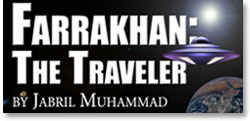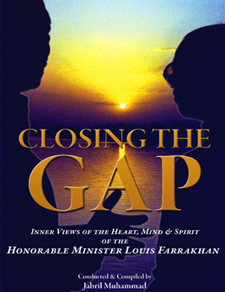JABRIL.MUHAMMAD
Trials and the manifestation of defects
Previous Farrakhan The Traveler Articles
 In recent articles I wrote two paragraphs from a few notes of a talk I made in 1995 in Phoenix, Arizona. I am now including the paragraph and a sentence that followed. “Of the last week, which includes what scholars call Jesus’ passion, which only refers to his extreme suffering.
In recent articles I wrote two paragraphs from a few notes of a talk I made in 1995 in Phoenix, Arizona. I am now including the paragraph and a sentence that followed. “Of the last week, which includes what scholars call Jesus’ passion, which only refers to his extreme suffering.
“The last week and day of Jesus’ life takes more space in the Bible (the part called Gospels) than all of his life up to that point. There is little mentioned of his actual birth. Next to nothing is written of the first thirty years of his life. There is brief notice given of an incident when he was twelve. Nothing else. Little is mentioned of the first year of his ministry. More is given of his second year. Still more is given of the third year plus.
“Then, eight of the twenty-eight chapters of Matthew; six of the sixteen chapters of Mark; nearly six of the twenty-four chapters that make up Luke; nearly ten of the twenty-one chapters that make up the book of John, cover from his last week through what is said to be his rise from the dead and his ascension. But even most of this space is taken up by the events of his last week.”
“What happened the last week and then the hours of his life? Black people have been taught that Jesus came into Jerusalem, riding on a colt or an ass; that he was hailed as the king of God’s coming kingdom, the son of David coming in the name of the Lord; his speeches; arguments with his opponents; violently driving the traders from the temple, Judas’ secret agreement to betray Jesus; the last supper; his prayers to the Father; the betrayal; the arrest; brought before the high priest and other officials, who were motivated by envy; before Pilate; Herod; before the mob that cries for his life; some spit on him, beat him, he is mocked, a crown of thorns put on his head, nails through his hands and feet, his agony, the intense darkness, an earthquake; his death on the cross; a few witness.
“They also say he survived death and he rose up to meet God in heaven.”
If you say that this refers to the Elijah Muhammad, and etc. you meet hostility and anger, etc. Why?
Now if you read The King James Version of the Bible in Matthew 26:59 you will read, “Now the chief priests, and elders, and all the council, sought false witness against Jesus, to put him to death …”
Why are these people called “false witness?” What were the characteristics of these men who participated in the murder of the man whom billions of people were taught to believe that he was the savior of the people of the world? Why did not God put an end to the world of evil back then?
******

Inner Views of the Heart, Mind & Sprit
of the
Honorable Minister Louis Farrakhan
Click here to Order
I hope those who read this will ask why I asked the Honorable Minister Louis Farrakhan the following question, “What are trials?” And why did I ask this of him, at the end of this book?
On page 347 of “Closing The Gap” we read:
Jabril Muhammad: Brother Minister, I would appreciate it, for myself, and everybody who reads this book, that you take us sequentially through your trials. What are trials?
The Honorable Minister Louis Farrakhan: Well first, what is a trial? A trial is that which brings forth from the person being tried what is hidden of both good and evil.
Trials make manifest what is within. This is why Allah says that He will try the Believers at least once a year–severely. Trials make manifest. The manifestation of defects leads to the perfection of the human being.
In the world of God and righteousness trials are as necessary to the perfection of the human being as water is to the growth and development of life; and sunlight and air is to the nurturing, preservation and origination of life.
Having said that, my first trial inside the nation came after I accepted to follow the Honorable Elijah Muhammad. I believe I received my “X” on the fifth of October. Within that same month of October, or early November, the Honorable Elijah Muhammad sent a letter to Mosque No. 7 asking all who were in music or in show business that they had thirty days to get out of show business or leave the Temple.
I was then working at a place called, “The Village Barn” in Greenwich Village, New York. I was not there when the letter was read on that Sunday because I had a matinee. I came to the restaurant that evening after my matinee to get a bowl of soup. A Brother gave me the content of the letter. I did not wait for an official to tell me. I got up from the table and walked, maybe about forty or fifty paces, outside of the restaurant and made up my mind right then that I could live without music but I could not live without the truth. So I decided to give up music. That was my first test thirty days inside of the nation.
Then sometime in December, I had my last engagement, which was within the thirty days. It was at a country club in the mountains in New York–I can’t remember the name of the mountains–but it was the Nevele Country Club. It is in the borsch circuit which means Jewish people went there for enjoyment; relaxation, etc.
That night I decided to get all my music out of my system. So I sang ballad; light classic. I sang blues. I sang calypso; mambo. I played classical violin; jazz violin. I danced. I told jokes. I did everything that I knew I could do.
In the audience was a man who came to my dressing room and he was the manager of Pearl Bailey and Billie Daniels. The world of music knows these two as great superstars in the 40s, 50s and 60s. He wanted me in the “stable” of these two and he offered me five hundred dollars a week to start.
Well I was making–say a hundred and fifty, or sometimes, for a performance, I would get seventy-five to a hundred and fifty dollars. But five hundred dollars a week in 1955 is like five thousand dollars a week in 1995 or 2005.
That was a trial. But I laughed and turned it down immediately and of course, I told you that that night I got that vision of show business and Islam. That was the second trial.
More next issue, Allah willing.












